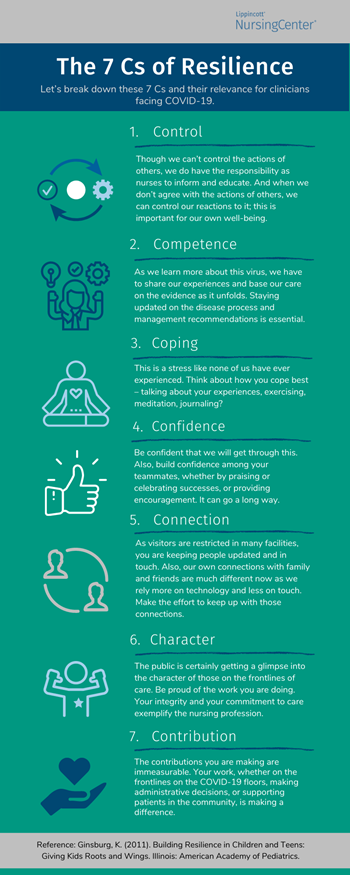Self-Care for Nurses
Self-care for nurses is not something new. Even before this pandemic, burnout in nursing, depression, compassion fatigue, and secondary traumatic stress have been studied extensively. As nurses, we tend to put the needs of others before our own self-care. It’s part of who we are, yet there has been no greater test of our resilience than the challenges we have been facing during COVID-19. We can’t continue to ask so much of ourselves and our colleagues, and it’s time to prioritize self-care and learn ways to prevent burnout in nursing. Time is running out; we need to protect and support one another. When the pandemic is a memory and COVID-19 is something we jot down in a patient’s history, we will still need nurses.
Below you’ll find words of understanding and wisdom from other nurses, strategies to improve self-care and resilience, along with tools and methods to help prevent burnout. Remember, leadership and institutions also must prioritize Solutions to Nurse Burnout.
Nurses’ Well-Being Blogs and Articles
 Self-care: How Can Nurses Succeed?
Nursing Made Incredibly Easy!
Self-care: How Can Nurses Succeed?
Nursing Made Incredibly Easy!
It's become apparent that burnout and compassion fatigue are commonplace. We must consider new approaches to mitigate the negative effects in the workplace.
Leadership Coaching for Team Support: Prioritize Self-Care First!
Nursing Administration Quarterly
Self-care quickly became a buzzword for health care workers during the recent pandemic. Strategies to improve self-care and build resiliency for our first-line workers were often seen in the literature or as topics at conferences and webinars. One strategy that was missing was the importance of leaders to be self-care role models for our employees.
Meaning and Joy at Work and Nurse Self-Care Practices: An Exploratory Study
Holistic Nursing Practice
The Institute for Healthcare Improvement Framework for Improving Joy at Work includes self-care as a strategy to support happy, healthy, and productive people; however, this relationship has not previously been empirically demonstrated. The purpose of this study was to describe self-care practices and levels of meaning and joy in work (MJW) in a sample of registered nurses and to explore the relationship between self-care and MJW.
Nurses – Are you Journaling? You Should Be!
Journaling is a private conversation that provides a safe place to express oneself without disapproval or judgement. The health benefits are numerous and include reduced stress and anxiety, lowered blood pressure, and improved immune function.
5 Steps to Help Find Your Joy
Pick up a mirror and take a look at yourself; joy and happiness from within changes your entire perspective.
It’s Time for a Timeout!
Take a timeout daily to reflect on what went well, how you could handle things differently that didn’t go as planned and identify what you can cast off because it’s toxic. It’s time to invest in ourselves and find our balance.
Nurse Wellbeing
AJN, American Journal of Nursing Collection
Prioritizing nurses’ mental health is essential. Browse this collection for journal articles on using storytelling as a tool, antidepressants, yoga, and more.
Self-Care for Nurses
Nursing made Incredibly Easy! Collection
The articles in this collection discuss and promote self-care for nurses.
Giving Meaning to Resilience during COVID-19
Lippincott NursingCenter
Resilience is often identified as an attribute to describe clinicians who face challenges time and time again, but are we doing a disservice by setting the expectation that we must be willing and strong enough to keep facing adversity?
My Nursing Care Plan
Lippincott NursingCenter
Use this quick care plan to make sure you are on the right track to meet your professional goals and optimize work/life integration.
Nurse Well-Being Tools from Professional Organizations